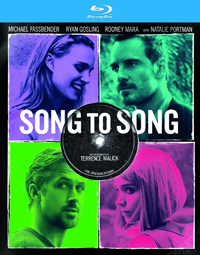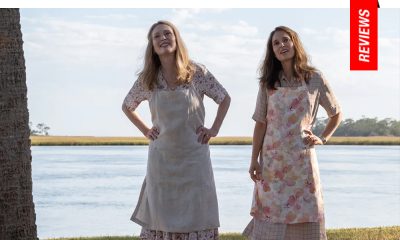Song to Song | Blu-ray Review
 Terrence Malick runs into his usual refrain in his latest, Song to Song, a film replete with aching, lost souls whose various interconnected narratives lurk amongst the glacial landscapes of Emmanuel Lubezki’s captivating frames. A distracting array of notable cast members only assist in sinking rather than enhancing this contemporary tale of ruinous amour fou amidst creative types in the Austin, Texas music scene. Box office returns were dismal, as the film played across the US in nearly one hundred theaters to take in only a bit more than four hundred thousand during a late March roll-out from Broad Green Pictures (which took in even less than the 2016 release of Knight of Cups from the same distributor, making over a hundred thousand more in a third less of the venues). Not without its own pronounced, sometimes numbing rhythm, it’s perhaps most disappointing for audiences curious to see Malick shakes things up a bit.
Terrence Malick runs into his usual refrain in his latest, Song to Song, a film replete with aching, lost souls whose various interconnected narratives lurk amongst the glacial landscapes of Emmanuel Lubezki’s captivating frames. A distracting array of notable cast members only assist in sinking rather than enhancing this contemporary tale of ruinous amour fou amidst creative types in the Austin, Texas music scene. Box office returns were dismal, as the film played across the US in nearly one hundred theaters to take in only a bit more than four hundred thousand during a late March roll-out from Broad Green Pictures (which took in even less than the 2016 release of Knight of Cups from the same distributor, making over a hundred thousand more in a third less of the venues). Not without its own pronounced, sometimes numbing rhythm, it’s perhaps most disappointing for audiences curious to see Malick shakes things up a bit.
Ever since his 2011 Palme d’Or winning The Tree of Life, Malick has been beguiled with recycling narratives as instruments of estrangement, disintegrating the emotional components of his troubled characters strained through kaleidoscopic, arresting visuals painstakingly edited into a string of potent montages, which protracted exposure to tends to elicit a mixture of bored detachment (To the Wonder, 2012) or punchy exaltation (as in the 2015 masterpiece Knight of Cups). His latest tends to drift languorously over its less cohesive elements, sprawling through moments and periods from the lives of its characters in the same way a clot of blood will coagulate at the mouth of a wound, scab over, flake off, and leave behind a residual scar. The end result isn’t mollifying, or perhaps even compelling, and yet Malick continues to force us to examine the contemporary human condition wherein success, achievement, and tangible possessions only enhance our disenchantment with the life we know reconciled with the feelings we expect. It is another chapter (and perhaps the last in a thematic quartet) of beautiful people trapped by their own definitions of existence, unable to “mind the gap” of the life they want with the life they lead, no matter how much validation (whether it be sex, love, or success) they receive. It is a formidably bleak testament of the disillusionment we all recognize but often stridently reject when presented so coercively in such expressive cinematic terms.
To describe the happenings of Song to Song couldn’t seem less simple, even superficial. A somewhat revered songwriter (Ryan Gosling), who is never directly named, develops a co-dependent relationship with a successful record producer, Cook (Michael Fassbender). Grazing over the procurable women throwing themselves at the men’s feet at a swank party, the songwriter is drawn to Faye (Rooney Mara), a mysterious woman wearing a blonde wig who drifts through the soiree ignoring everyone. Faye is an aspiring musician herself, a woman who began working as a receptionist for Cook and then became his lover as a means to jumpstart her career. But as she begins to develop a relationship with Cook’s client, she becomes unable to tell him of the ongoing affair with the aggressive producer. The three of them travel to Mexico together, each unaware of how much the other ones know. Before their tryst can implode, however, Cook absconds with a waitress (Natalie Portman), whisking her off into a magical marriage while Faye and her melancholy songwriter drift apart, leaving him to develop a relationship with Amanda (Cate Blanchett), while she explores her sexuality with a sultry Parisian (Berenice Marlohe).
Malick’s clues and metaphors abound, perhaps a bit too obtusely, in the snippets of dialogue and whispery narration of its characters’ internal monologues. Rooney Mara’s morose rock n ’roll singer (we really only see her holding a guitar, and her continual interactions with the always captivating Patti Smith would seem to indicate the angle of her character’s musical inspirations) explains it best in the opening moments, describing a period in which she required rough sex because every kiss only felt half as powerful or meaningful as it should. And this is one of the angles in which Song to Song grasps at our ability to understand how we seek new thrills, connections, and experiences, but our limited perspectives and various social expectations suffocate us by shackling us to notions of adherence (tradition, formula, and the comfort of familiarity), yet it is these ideas which cause the deadening of our senses and emotion due to repetition, overexposure. The initial honeymoon period of “love,” as Mara explains in her feelings towards Gosling, make her wish to live only in a particular moment, from ‘song to song’ no break, only refrain. But it’s this refrain which causes patterns, repetitions, and these vehicles of succor once the spigot for creative inspiration evaporate, mutating into a vampiric codependency because of the inability to discern when enough is enough.
Effectively, this notion of starting over and rebirth is rationalized during an aside from Berenice Marlohe’s Zoey, who has a lesbian fling with Mara (but is presented in such a way to suggest Faye is simply trying to ‘shake that man right out of my hair’ rather than an unexplored facet of her sexuality). Explaining her admiration for the portrait of a snake shedding its skin, Zoey gushes over the notion of reinvention, the lucrative possibility of rising like a phoenix out of one’s own ashes. Except, what Faye and the other broken characters of Song to Song slowly realize is how reinvention of self doesn’t allow one to forget the past one has fled.
The troubling threesome which makes up a significant portion of the film, where Mara is most prominent, are often featured outside in the elements, whether man-made as in the periphery of various parties and concerts (where we find Big Freedia, Lykke Li, Iggy Pop, and Val Kilmer), or in the bosom of nature, where they flirt and flit in the wondrous natural landscapes photographed once more by the incomparable Emmanuel Lubezki (whose vistas aren’t quite as varied or textured as they were in the earlier Knight of Cups). But as they are slowly crushed and weighted down by their consciousness (or, perhaps social expectations), we retreat with them to a diminished capacity, where Gosling and Mara desperately mull over the meaning of what her affair with Cook means for them. Mechanically, they have sex on a table inside their empty tomb of a home, paper clouding the windows, and a mobile of wooden birds now replacing the actual winged creatures which once soared above them. At times, some of the endless narration from intersecting characters feels leaden and belabored. “I revolted against goodness,” Mara’s Faye informs us triumphantly late in the film, as she tends to children playing quietly on a lawn featuring a prominent speed limit sign. Banalities may have eroded these characters’ sense of self, but they’re still prone to self-involved pretentiousness.
It’s here where Song to Song shifts away from them, as Cook builds himself a new home, so to speak, my commandeering Natalie Portman. She becomes his sex object, indebted to him for restoring her mother as a homeowner (a brief stint from Holly Hunter). Her eventual tragic demise follows one of the film’s most curious moments, when a prostitute acquired by Cook stays too late the next morning, sharing her tragic circumstances with Portman, who realizes her trajectory isn’t any different. The effect of the mother is examined further with Linda Emond, appearing as Gosling’s matriarch, a woman who refuses to approve of his relationship with an older, married woman played by Cate Blanchett.
Mistakes are made, journeys are continued. Patti Smith sports a ring she purchased after the death of her husband, one given to the runners who complete but do not win the race. From song to song, cycle to cycle, or love to love, these sequences suggest moments of absence, unhappiness, pain, suffering, doubt, or confusion as one ends and the other begins. But the only real song with arguably defined parameters is cradle to grave, the realization which drives us back to repeat, renew, and replenish all the things which promise another spin on the merry-go-round.
Disc Review:
Broad Green brings Song to Song to Blu-ray in widescreen 2.39:1 with 5.1 DTS-HD Master Audio. Those hoping for more of an aural experience will be disappointed, while no transfer has ever rightly done justice to Lubezki. Still, for this meandering venture, this presentation is serviceable. Broad Green includes a solo extra feature on the disc.
The Music Behind the Movie:
This two minute segment finds producer Sarah Green explaining how Malick’s idea behind Song to Song began several years prior.
Final Thoughts:
More along the lines of the 2012 B-side pretension To the Wonder, Malick’s Song to Song will do little to enhance the good will garnered from something like Knight of Cups and perhaps will be the closing chapter of a meandering decade in his filmography.
Film Review: ★★★/☆☆☆☆☆
Disc Review: ★★★/☆☆☆☆☆
Los Angeles based Nicholas Bell is IONCINEMA.com's Chief Film Critic and covers film festivals such as Sundance, Berlin, Cannes and TIFF. He is part of the critic groups on Rotten Tomatoes, The Los Angeles Film Critics Association (LAFCA), the Online Film Critics Society (OFCS) and GALECA. His top 3 for 2021: France (Bruno Dumont), Passing (Rebecca Hall) and Nightmare Alley (Guillermo Del Toro). He was a jury member at the 2019 Cleveland International Film Festival.



































